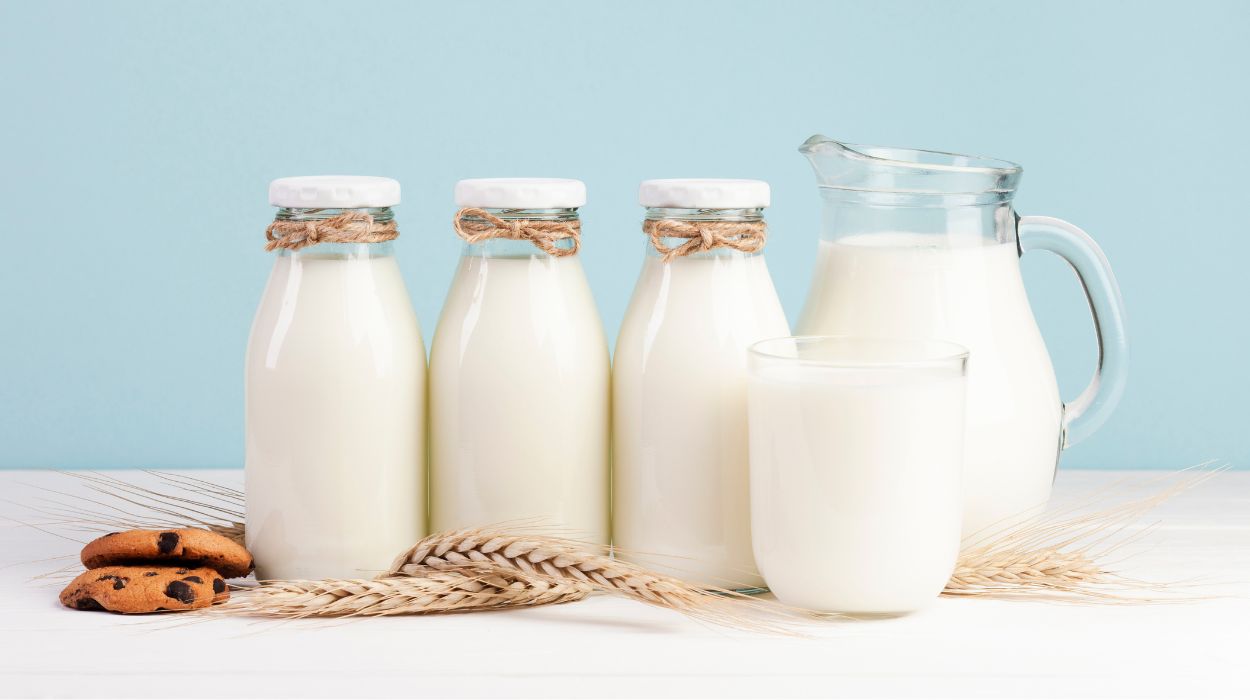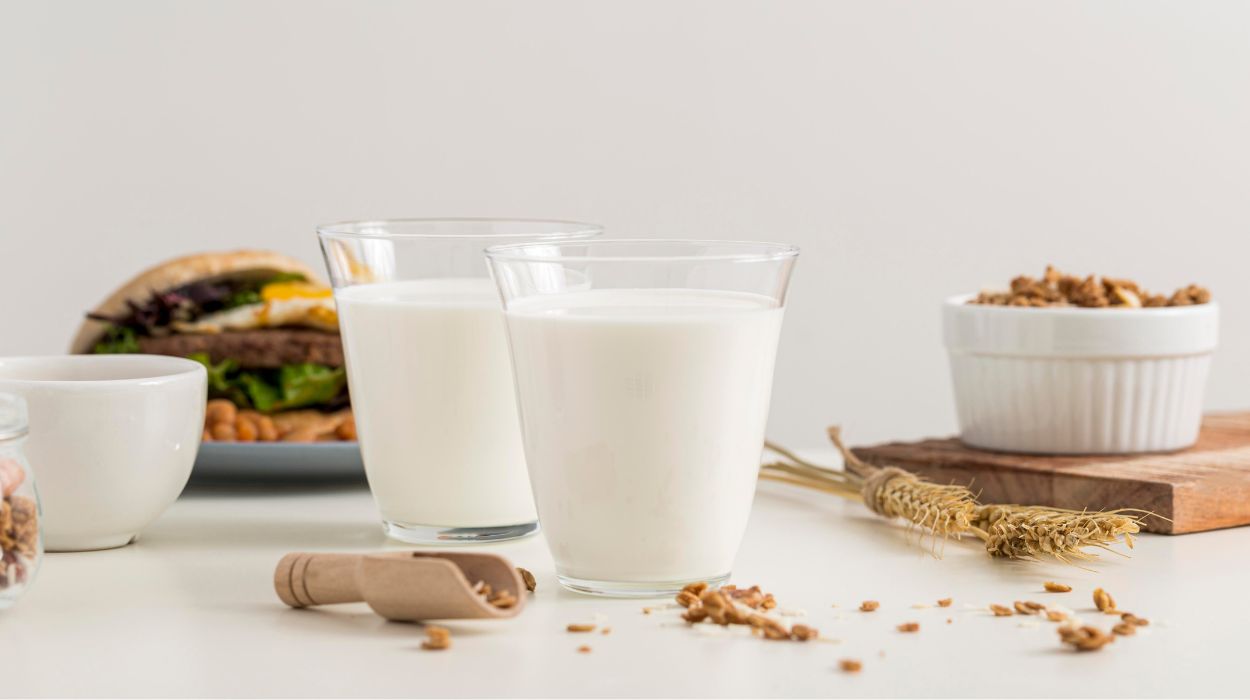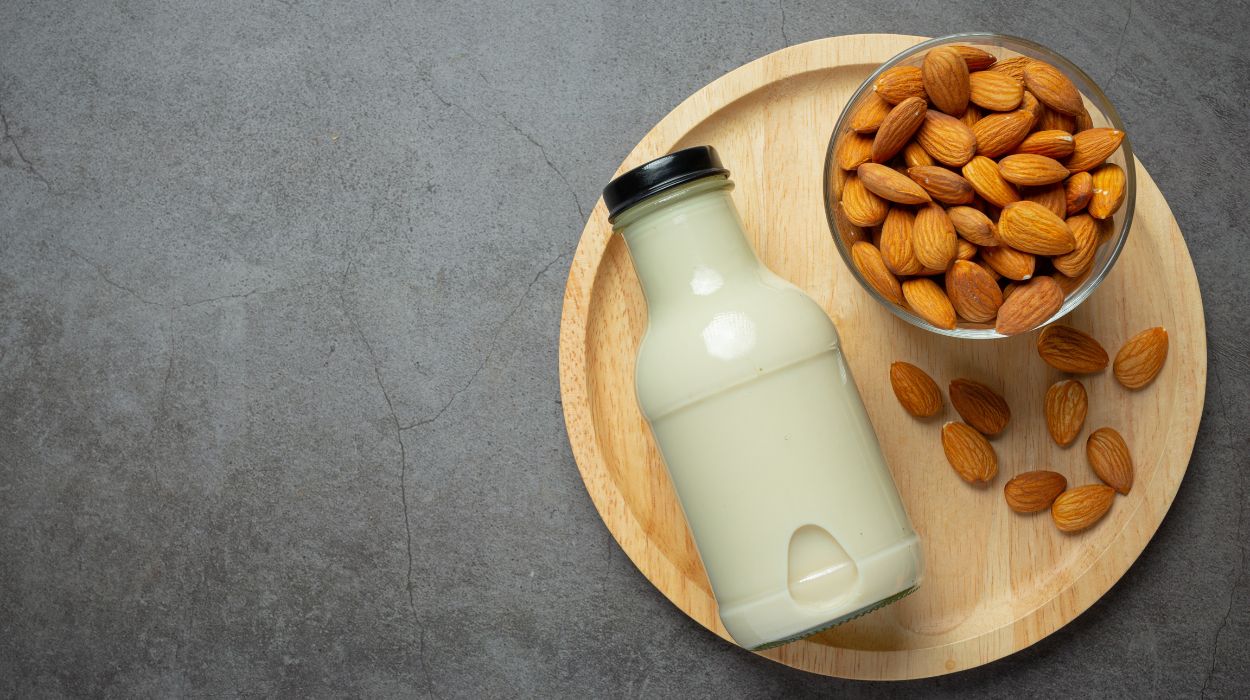 Expert's opinion
Expert's opinion
Expert's opinion
The article is a subjective view on this topic written by writers specializing in medical writing.
It may reflect on a personal journey surrounding struggles with an illness or medical condition, involve product comparisons, diet considerations, or other health-related opinions.
Although the view is entirely that of the writer, it is based on academic experiences and scientific research they have conducted; it is fact-checked by a team of degreed medical experts, and validated by sources attached to the article.
The numbers in parenthesis (1,2,3) will take you to clickable links to related scientific papers.
Is Milk Good For You? Stunning Benefits Of Drinking Milk In 2024

The iconic Got Milk? campaign is still regarded as a landmark in advertising history. It was a true cultural phenomenon, with now-legendary director Michael Bay directing the first of many ‘milk mustache’ commercials and famed photographer Annie Liebovitz leading the print campaigns.
That humble little mustache, worn with pride throughout the years by the cast of Friends, Frasier, and other iconic TV shows, supermodels (Kate Moss, Naomi Campbell), global musical superstars (such as Elton John, Britney Spears), and world-famous athletes (Tom Brady) certainly made milk cool again. But is milk good for you? And do dairy-free alternatives deliver the benefits that they claim? Let’s find out!
Is Milk Healthy?
Is drinking milk good for you? Yes, it is.
From newborns and new mothers to athletes and senior citizens, it is nutritious to drink milk, which can provide incredible health benefits for us all. The key is to find the right milk that suits our lifestyle, digestive needs, and taste buds, and to then sit back, enjoy, and let the nutritional benefits of this liquid gold flow through your body!
Is Milk Good For You?
Milk is power-packed with nutrients that we simply can’t afford to miss out on.
In this article, we’ll cover milk’s health benefits for your body and mind, including how milk is good for your bones and teeth. We’ll also be looking at the dairy and dairy-free milk alternatives (almond, oat, coconut, soy, cashew, goat milk, and macadamia) and how much of them you should be drinking daily. And, if you are worried about the saturated fat in milk, choose the low-fat options!
We’ll discuss how milk is a great choice for losing body fat and boosting diet success. And finally, we’ll let you know how you can even successfully follow a lectin-free diet (popular amongst gluten-intolerant and irritable bowel syndrome sufferers) while also greatly enjoying the wonders of milk daily.
Nutrients In Milk
Many people don’t realize that milk and dairy products are food! And it’s one heck of a nutrient-packed food, too. So why is milk good for you?
Just one glass of dairy milk comes power-packed with an amazing nine essential nutrients: vitamin D, calcium, protein, vitamins B2 and B12, potassium, vitamin A, magnesium, and phosphorus. Since many of us tend to be low in calcium, potassium, and Vitamin D, dairy products remain a solid choice in our daily diets if we want to be as healthy and happy as we can be!
There are many dairy-free alternatives, too, all with unique but different nutrient contents.
Oat milk is certainly good for you. It is particularly high in a fiber called beta-glucan (great for the heart and digestive health) and is also particularly environmentally friendly to produce. Is almond milk good for you? Yes, it certainly is! It contains a higher calcium content than cow’s milk and is perfect for anyone following a lectin-free diet as it is lectin-free.
Soy milk is good for you, too, as it is high in protein and contains all nine essential amino acids, while macadamia milk is full of goodness, offering a great source of vitamin D. Some may ask, is cashew milk good for you? Cashew milk, while not so high in calcium, offers impressive levels of manganese and magnesium (great for sleep, healthy bones, and emotional health).
And is coconut milk good for you too? Sure. It also contains some heart-healthy fats that may boost weight loss and energy in the short term (and offers a creamy, indulgent texture – great for healthy protein shakes and baking!), while goat milk is good for you because it combines the healthy-fat benefits of coconut milk with the calcium and other nutrient-rich benefits of cow’s milk.
Proven Milk Health Benefits

The benefits of this incredible food are extensive! And we’ve curated our top five favorites right here.
Amazing For Diet Success
A glass of low-fat cow’s milk includes an impressive serving of protein, which helps to regulate appetite and promotes a feeling of fullness while potentially boosting fat loss. Milk suits a low-calorie profile, which is ideal for fat-loss goals while simultaneously packing in all the nutrients you need to stay healthy throughout the dieting process.
Unrivaled Benefits For Bone Health
Consuming milk offers a very cheap and accessible source of high-quality calcium and magnesium, which makes it a powerful option for maintaining bone health. It also plays a valuable direct role in providing the nutrients and peptides needed for the osteoblastic (bone formation) process to take place.
Slows Down Brain Aging
Drinking low-fat milk has been found by a recent academic study to provide a marked effect in slowing down the aging of the brain. This cognitively strengthening effect of milk may be so powerful that it even helps to protect us against the onset of Alzheimer’s disease.
Clear And Smooth Skin
This might be the least known benefit, but milk and dairy intake have been found, by recent scientific studies,[1] to benefit skin, promoting clear dermatological and cosmetic benefits! Milk may bestow a whitening effect moisturizing the skin while toning and smoothing its texture.
A Great Base For Protein Shakes
Finally, meeting your daily protein requirements offers a whole heap of health benefits, but it can be hard to achieve. Protein powders, no longer the mainstay of bodybuilders and athletes, are now used by regular office workers, students, and housewives to easily max out on their nutritional protein-based requirements, contributing to fat loss, great sleep, smooth skin, and better energy and focus.
Side Effects Of Milk
But can milk also be bad for you? Well, not really, but there is a caveat – the key is to choose the right kind of milk that suits your body and not consume it to excess.[2]
Here’s why. Because cow’s milk is high in a sugar called lactose, many of us might experience unpleasant side effects when we drink it. Suppose you’ve ever experienced bloating, gas, or fatigue after drinking what you thought was a healthy protein shake or had a particularly awful stomach cramp after enjoying a bar of milk chocolate. In that case, it might be lactose that is the direct cause of your woes.
It is thought that as much as 65%[3] of us are intolerant to lactose. The great news, however, is that there are so many awesome dairy-free milk alternatives on the market that enable us to enjoy the benefits of milk without any of the drawbacks of lactose. If you insist on dairy and are lactose-intolerant, you can always purchase the enzyme lactase (brand name is Lactaid) that will break down the lactose, so you don’t experience the side effects.
If you have diabetes, you also need to be aware that dairy milk can spike blood sugar,[4] so opting for dairy-free alternatives, particularly those with no added sugar, could be a great choice.
How Much Milk Should You Drink?
According to the Centers for Disease Control and Prevention, babies should not ingest cow’s milk before the age of 12 months.[5] Children between the ages of 9-14 must eat dairy (including milk) daily as this is a period where bone development reaches a peak. And adults, throughout their lifespan, should be aiming for around 2-3 cups equivalents of dairy (which includes milk) per day, according to the U.S. Department for Agriculture Dietary Guidelines for Americans.[6]
Alternatives To Milk

What happens if a milk mustache just isn’t the right look for you? Meh, it happens. If milk just isn’t your thing, that’s okay. But we’re always told to drink our milk to get our calcium and vitamins, right?
Right. But there are other ways to get the same benefits, too! Here’s how.
Dairy-Free Alternatives To Milk
Almond Milk
When most people think of milk, they are talking about cow’s milk. While this lactose-rich version might make you queasy, you might simply adore the different textures and tastes of dairy-free alternatives like oats milk, coconut, goat, or cashew. Why not give them a try as a base for a protein shake, cereal, coffee creamer, soup, or cake today?
You might wonder, is almond milk good for me in the same manner as cow’s milk? Almond milk is a nutritious alternative low in calories, good for blood sugar, and, when enriched, is high in calcium and vitamin D.
However, it is essential to look for a non-dairy alternative that is fortified with vitamin D, calcium, and if you are a vegan, vitamin B12.
Other Dairy Products
Many of us are fortunate enough to tolerate lactose, so dairy products like cheese can be a great option (pizza sounds great just about now!), but you might still struggle with milk – as the lactose quotient in milk tends to be a lot higher. Opting for low-lactose dairy products like butter, yogurt or cheese can subsequently offer the same benefits as milk but without risking any gas and indigestion!
Meat And Seafood
A similarly rich smorgasbord of protein and nutrient-rich benefits awaits you if you opt for a high-quality filet steak (amazingly creatine and iron-rich) or heart-healthy salmon. Opting for mostly lean, white meat is the key to switching out milk with meat. The U.S. Department of Agriculture recommends that pregnant women should aim to eat at least 8 ounces-12 ounces[7] of seafood per week, making sure they choose low-mercury choices[8] as per the Food and Drug Administration.
Nuts
An incredible source of heart-healthy omega oils, fiber, and protein, a handful of nuts[9] can offer many of the nutritional benefits of milk while also being very low in carbohydrates. They are loaded with antioxidants, which are great for the immune system and have been linked to more effective fat loss in scientific studies.
Protein Shakes
These days, the science behind protein shakes is incredible. Plant-based hemp shakes meet the needs of eco-conscious vegans, while powerfully nutrient and amino-acid stacked fortified whey isolate options can supercharge any athlete. The options are almost endless, and the vitamin, mineral, and probiotic content can meet and even exceed the benefits of milk in a dose that suits any body shape, type, size, or health goal, using water or dairy milk alternatives as a base.
Is Milk Thistle Good For Your Liver?
Milk Thistle, while not a dairy or dairy alternative, is a plant named after[10] milk products. While historically, it has been used for liver and gallbladder problems; there is limited clinical evidence that it helps in either condition. However, a recent study claimed it had protective benefits for the liver,[11] was potentially good for those with diabetes, and could effectively treat those with non-alcoholic fatty liver disease.
The Bottom Line
Milk is just too awesome not to include in our daily diets. Maybe you just can’t start the day without a triple mocha latte with extra froth (thanks, friendly barista!), or perhaps a simple splash of skim milk over your bran flakes is all you need to get started. And for the kids whose healthy bones are still growing? A strawberry milkshake can’t be beaten! Finally, who hasn’t ever eaten their mom’s unbeatable warm apple pie without a cold glass of milk to wash it down with?
The unbeatable fact is milk isn’t just versatile – it is also power-packed with nutrients that we simply can’t afford to miss out on – and it is cheap and easy to obtain. So while many people spend a fortune in health food stores, the bottom line is that you should continue enjoying more than a little of this nutritionally impressive white gold in your diet every day!
+ 11 sources
Health Canal avoids using tertiary references. We have strict sourcing guidelines and rely on peer-reviewed studies, academic researches from medical associations and institutions. To ensure the accuracy of articles in Health Canal, you can read more about the editorial process here
- Kazimierska, K. and Kalinowska-Lis, U. (2021). Milk Proteins—Their Biological Activities and Use in Cosmetics and Dermatology. Molecules, [online] 26(11), p.3253. doi:10.3390/molecules26113253.
- Michaelsson, K., Wolk, A., Langenskiold, S., Basu, S., Warensjo Lemming, E., Melhus, H. and Byberg, L. (2014). Milk intake and risk of mortality and fractures in women and men: cohort studies. BMJ, [online] 349(oct27 1), pp.g6015–g6015. doi:10.1136/bmj.g6015.
- Vuorisalo, T., Arjamaa, O., Vasemägi, A., Taavitsainen, J.-P., Tourunen, A. and Saloniemi, I. (2012). High Lactose Tolerance in North Europeans: A Result of Migration, Not In Situ Milk Consumption. Perspectives in Biology and Medicine, [online] 55(2), pp.163–174. doi:10.1353/pbm.2012.0016.
- Nilsson, M., Stenberg, M., Frid, A.H., Holst, J.J. and Björck, I.M. (2004). Glycemia and insulinemia in healthy subjects after lactose-equivalent meals of milk and other food proteins: the role of plasma amino acids and incretins. The American Journal of Clinical Nutrition, [online] 80(5), pp.1246–1253. doi:10.1093/ajcn/80.5.1246.
- CDC (2022). Cow’s Milk and Milk Alternatives. [online] Centers for Disease Control and Prevention. Available at: https://www.cdc.gov/nutrition/infantandtoddlernutrition/foods-and-drinks/cows-milk-and-milk-alternatives.html.
- Usda.gov. (2017). USDA ERS – Fluid Milk Consumption Continues Downward Trend, Proving Difficult to Reverse. [online] Available at: https://www.ers.usda.gov/amber-waves/2022/june/fluid-milk-consumption-continues-downward-trend-proving-difficult-to-reverse/#:~:text=The%20Dietary%20Guidelines%20for%20Americans,and%20level%20of%20physical%20activity.
- Usda.gov. (2023). AskUSDA. [online] Available at: https://ask.usda.gov/s/article/How-often-should-I-eat-seafood.
- Center (2022). Advice About Eating Fish. [online] U.S. Food and Drug Administration. Available at: https://www.fda.gov/food/consumers/advice-about-eating-fish#choice.
- NHS Choices (2023). Fat: the facts. [online] Available at: https://www.nhs.uk/live-well/eat-well/food-types/different-fats-nutrition/.
- NCCIH. (2018). Milk Thistle. [online] Available at: https://www.nccih.nih.gov/health/milk-thistle.
- Doostkam, A., Fathalipour, M., Anbardar, M.H., Purkhosrow, A. and Mirkhani, H. (2022). Therapeutic Effects of Milk Thistle (Silybum marianum L.) and Artichoke (Cynara scolymus L.) on Nonalcoholic Fatty Liver Disease in Type 2 Diabetic Rats. Canadian Journal of Gastroenterology and Hepatology, [online] 2022, pp.1–8. doi:10.1155/2022/2868904.



